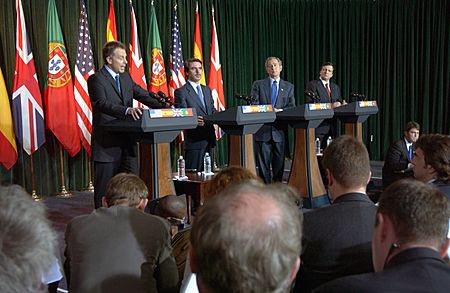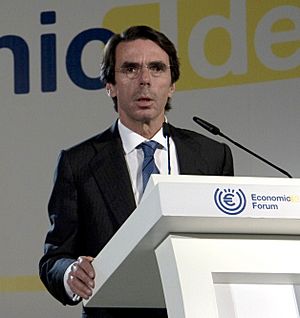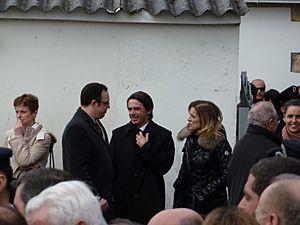José María Aznar facts for kids
Quick facts for kids
The Most Excellent
José María Aznar
|
|
|---|---|
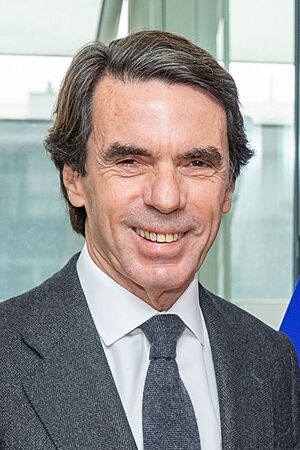
Aznar in 2020
|
|
| Prime Minister of Spain | |
| In office 5 May 1996 – 17 April 2004 |
|
| Monarch | Juan Carlos I |
| 1st Deputy | Francisco Álvarez-Cascos Mariano Rajoy Rodrigo Rato |
| 2nd Deputy | Rodrigo Rato Javier Arenas |
| Preceded by | Felipe González |
| Succeeded by | José Luis Rodríguez Zapatero |
| President of the People's Party | |
| In office 1 April 1990 – 2 October 2004 |
|
| Deputy | Francisco Álvarez-Cascos Javier Arenas Mariano Rajoy |
| Preceded by | Manuel Fraga |
| Succeeded by | Mariano Rajoy |
| Leader of the Opposition | |
| In office 21 November 1989 – 4 May 1996 |
|
| Monarch | Juan Carlos I |
| Prime Minister | Felipe González |
| Preceded by | Manuel Fraga Iribarne |
| Succeeded by | Felipe González |
| President of the Junta of Castile and León | |
| In office 27 July 1987 – 16 September 1989 |
|
| Preceded by | José Constantino Nalda |
| Succeeded by | Jesús Posada |
| Member of the Congress of Deputies | |
| In office 21 November 1989 – 15 January 2004 |
|
| Constituency | Madrid |
| In office 18 November 1982 – 7 July 1987 |
|
| Constituency | Ávila |
| Member of the Cortes of Castile and León | |
| In office 10 June 1987 – 16 September 1989 |
|
| Constituency | Ávila |
| Personal details | |
| Born |
José María Alfredo Aznar López
25 February 1953 Madrid, Spain |
| Political party | People's Alliance (1979–1989) People's Party (1989–) |
| Other political affiliations |
Frente de Estudiantes Sindicalistas |
| Spouse | |
| Children | José María (b. 1978) Ana (b. 1981) Alonso (b. 1988) |
| Alma mater | Complutense University of Madrid |
| Signature | |
José María Aznar López (born 25 February 1953) is a Spanish politician. He served as the prime minister of Spain from 1996 to 2004. He was also the leader of the People's Party (PP), a major political group in Spain.
In his youth, Aznar studied law and worked as a financial inspector. He joined the People's Alliance, which later became the People's Party. Before becoming prime minister, he led the government of Castile and León from 1987 to 1989. He was also the Leader of the Opposition for Spain from 1989 to 1996. In 1995, he survived an attack by the group ETA.
Aznar's People's Party won the 1996 election. He became prime minister on 4 May 1996. His time in office focused on making the economy more open and selling off some state-owned companies. Spain's economy grew, and the country was able to join the eurozone. He won another election in 2000 with a clear majority.
During his second term, Spain became closer to the United States after the September 11 attacks. Aznar supported the invasions of Afghanistan and Iraq. This decision was not popular with most Spanish people. In 2002, his government faced criticism for how it handled a large oil spill in Galicia.
In 2004, a new election was planned. Just three days before, the 2004 Madrid train bombings happened, killing many people. The government first said ETA was responsible. However, many people believed the government was not telling the full truth. This led to a big drop in support for Aznar's party. The opposing PSOE won the election.
After leaving office, Aznar continued to be active in public life. He leads a think tank called FAES and has been involved with other international groups.
Contents
Early Life and Education
José María Aznar was born in Madrid, Spain, in 1953. His father and grandfather were both journalists and held government jobs during the time of Franco's dictatorship.
He went to school at the Colegio del Pilar in Madrid. As a teenager, he was part of a student group called the Frente de Estudiantes Sindicalistas (FES). This group had different ideas from the government at the time.
Aznar studied law at the Complutense University of Madrid. He graduated in 1975 and became a tax inspector in 1976.
Joining Politics
Starting with People's Alliance
After Spain became a democracy again, Aznar joined a political party called Alianza Popular (AP) in 1979. He quickly became a leader within the party. In 1982, he was elected to the Spanish parliament, representing Ávila.
In 1987, he became the president of the region of Castile and León. He led a government with another party.
Leader of the Opposition
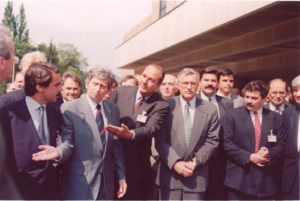
In 1989, the People's Alliance party changed its name to the Partido Popular (People's Party, or PP). Aznar was chosen as the new leader of the party. He was confirmed as leader in March 1990.
In the 1993 general election, the PP did better than before but still lost. However, they gained more support in later local and European elections.
On 19 April 1995, Aznar was targeted in an attack by ETA. His armored car protected him from a bomb.
The PP won the general election on 3 March 1996. This ended 13 years of rule by the PSOE party. Aznar's party did not win enough seats to govern alone. So, he had to make agreements with other regional parties from Catalonia, the Canary Islands, and the Basque Country. He became prime minister on 5 May 1996.
Prime Minister of Spain
First Term (1996–2000)
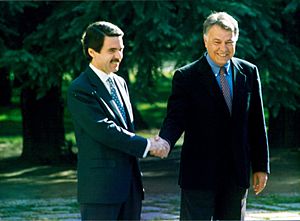
Aznar's government was the first conservative government in Spain since 1983.
His government worked to help Spain join the European Union's single currency. They also sold off parts of state-owned companies like Telefónica and Repsol. This was a time when the government sold many public businesses.
Second Term (2000–2004)
Spanish voters chose Aznar again in the 2000 general election. His party won a clear majority of 183 seats out of 350.
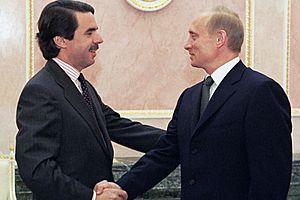
During this time, Spain's economy continued to grow, and unemployment started to fall. In foreign policy, Spain became a strong supporter of the United States and the Bush administration after the September 11 attacks. Aznar supported the US-led invasions of Afghanistan and Iraq.
In 2002, Aznar's government faced criticism for its handling of the Prestige oil spill off the coast of Galicia. Support for his party also dropped after the invasion of Iraq, which most Spanish people did not support. A poll in 2003 showed that 91% of Spaniards were against the invasion.
In January 2004, Aznar announced that he would not run for a third term. He chose Mariano Rajoy to be the new candidate for his party. Polls suggested that the People's Party would win the election again.
Madrid Train Bombings and End of Term
Three days before the 2004 general election, on 11 March 2004, 10 bombs exploded on trains in Madrid. These attacks killed 191 people. At first, the government said that ETA might be responsible. However, even when evidence pointed to an Islamist group, the government continued to blame ETA.
Many people felt the government was hiding information. This led to large protests across Spain. People demanded to know the truth before the election. Two days after the bombings, the opposing PSOE won the election. Aznar left office on 17 April 2004.
After His Time as Prime Minister
After leaving office, José María Aznar became the president of FAES, a think tank linked to the People's Party. He also became a member of the Council of State for a time.
Aznar has taught at Georgetown University in Washington, D.C. He teaches about European politics and the relationship between Europe and the United States. He has also received several honorary degrees from universities around the world.
He joined the board of directors of News Corporation, a large media company. He is also a member of the Club de Madrid, an organization of former world leaders who work to promote democracy.
Political Views
Environmental Issues
In 2008, Aznar said that climate change was "scientifically questionable." He compared it to a religion and called its followers "enemies of freedom." These views were different from his government's earlier support for the Kyoto Protocol in 1998. His party later said his views were part of a "skeptical minority."
Foreign Policy
Israel
In 2010, Aznar started the Friends of Israel Initiative. This group aims to support Israel and its right to exist peacefully. He has said that Israel is important for Western countries and should be protected. In 2014, he suggested that Israel should become a full member of the European Union.
Personal Life
In 1977, Aznar married Ana Botella. They have three children: José María, Ana, and Alonso. Their daughter Ana has four children.
Books Written by Aznar
- Libertad y solidaridad (1991)
- La España en que yo creo (1995)
- España: la segunda transición (1995)
- Ocho años de Gobierno (2004)
- Retratos y perfiles: de Fraga a Bush (2005)
- Cartas a un joven español (2007)
- España puede salir de la crisis (2009)
- Memorias I (2012)
Awards and Honors
- Collar of the Order of Isabella the Catholic (2004)
- Grand Cross of the Order of Prince Henry (1996)
- Grand Cross of the Order of Merit of the Republic of Poland (2003)
- Many honorary doctorates from universities in the US, Italy, Peru, Chile, Guatemala, and Spain.
- Gold Medal of Madrid (2011)
- America Award of the Italy-USA Foundation (2019)
See also
 In Spanish: José María Aznar para niños
In Spanish: José María Aznar para niños
 | Calvin Brent |
 | Walter T. Bailey |
 | Martha Cassell Thompson |
 | Alberta Jeannette Cassell |


